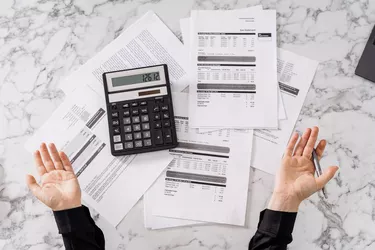
There are few things more personal than your spending and bank account activity. Everyone knows how important it is to keep this information private. But can you erase past banking statements?
Wanting to Delete Bank Statements
Video of the Day
You could have any one of several reasons for wanting to delete bank statements, transactions or account histories. Those reasons are as personal as the transactions themselves. You should never attempt to hide a financial trail when involved in a legal battle, however, as this information can be obtained by subpoena in certain situations. Attempting to hide transactions or bank statements likely won't be fruitful, nor will it help your case.
Video of the Day
There are laws and statutes governing the storage of transactions and data by banking institutions. It's important to understand how much control you, as the account holder, have over what gets stored and your ability to delete your history.
Can You Delete Bank Statements?
Officially, you can't delete a bank statement. Bank statements are technically legal documents. They can be subpoenaed in civil and criminal court proceedings, and for that reason, it's illegal to delete them or tamper with them in any way.
Your bank is not allowed to delete your past statements or even any past transactions, even at your request. They could face serious penalties and fines for doing so.
Consider also: Is a Bank Statement Considered a Legal Document?
Can You Delete Bank Transactions?
Once again, the answer is no, you cannot delete bank transactions, for much the same reason as above. Your transactions can become evidence in court, and they are considered to be part of a legal document.
This is true not just for criminal cases, but for other types of court proceedings, as well. For example, transactions can provide important information or evidence in divorce cases, as well as in probate disputes.
If you have personal, non-criminal reasons for wanting to alter your bank statements, you may want to consider opening a separate account for those types of transactions and managing them apart from your other bank activity. Alternatively, you can customize printable account histories.
Customizing Your Bank Statements
Your official, legal bank statement can't be customized. It will always show all of your transaction histories, including every withdrawal and deposit you made throughout the billing period.
That being said, you can download account histories that filter certain types of transactions in and out. Most banks allow you to do this online after you create an account. Each bank's online portal is different, so if you're having trouble, try searching their Frequently Asked Questions, like those provided by Wells Fargo, or contact customer service for more help.
Move to Online Statements
If paper bank statements are cluttering your mailbox and filing cabinet, you can opt to store them digitally instead. This is also a good option if you desire to keep your transactions private from someone else in your household. When you view your online statements, most banks will give you the option of switching to paperless. Instead of an envelope in the mail every month, you'll just get an email letting you know that the document is available and inviting you to log into your account to view it. Then, it's totally up to you whether you choose to view the statement.
If you need to furnish a bank statement for some reason, like to provide proof of payment to a company, and don't wish for all of your transactions to be made known to them, paper statements or printed versions of online statements can be quite useful.
Make a copy first so you have the original with all its details for your records. Then, you can use a permanent marker or whiteout to hide the parts of your statement you do not wish to share. Then, you can scan or send the bank statement to the interested party, all while maintaining your privacy.
How Long to Keep Bank Statements
How long should you keep your bank statements? The answer to this question depends quite a lot on the sort of banking you do. A good rule of thumb for personal checking and savings accounts is to keep your statements for at least one year. If you use them to prove your income or demonstrate charitable donations, then it's a good idea to keep them for at least three years.
The National Consumer Law Center notes that bank statements are an important consumer protection. The information they contain can be beneficial to you, so there is value in holding onto it.
When it comes to banks, that's another story. Generally speaking, banks are required by law to keep statements for five years. With the growing capability of major corporations to hold onto and store data, some are opting to keep this information for much longer.